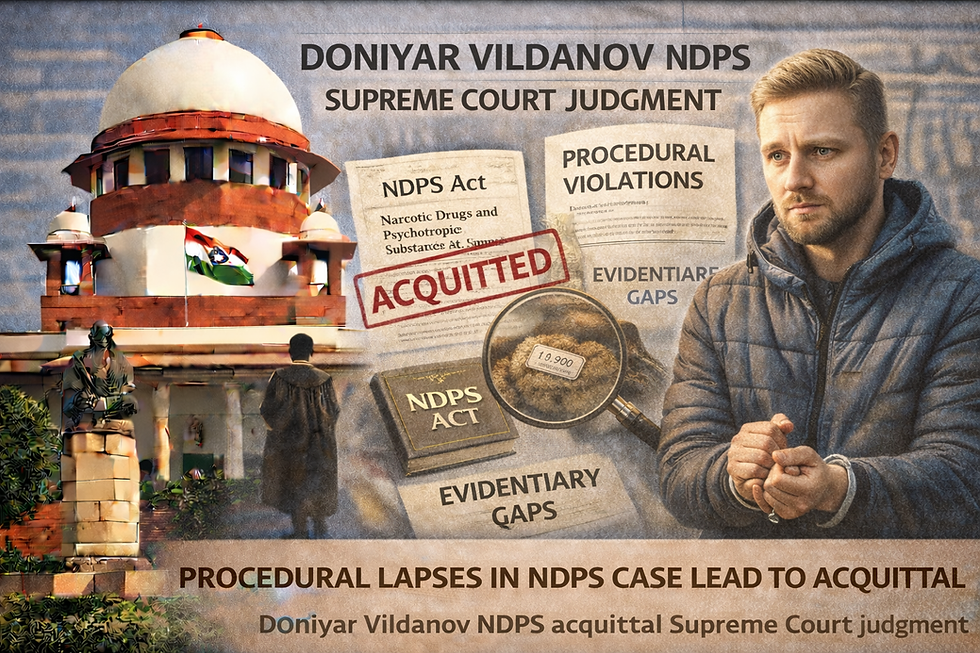Supreme Court Affirms: 'Tamil Nadu Medical Services Corporation is an Industrial Establishment' – Landmark Judgment Explained
- Chintan Shah

- May 22, 2024
- 4 min read
Updated: Jul 9, 2024
Summary of the Judgment
Case Name: Tamil Nadu Medical Services Corporation Limited vs. Tamil Nadu Medical Services Corporation Employees Welfare Union & Anr.
Date: May 17, 2024
Judges: Honorable Justice Sanjay Karol, Honorable Justice Prasanna Bhalachandra Varale
Acts and Sections: Tamil Nadu Industrial Establishments (Conferment of Permanent Status to Workmen) Act, 1981 Tamil Nadu Shops and Establishments Act, 1947 Indian Companies Act, 1956
Cited Judgments: State of Karnataka v. Uma Devi (2006) 4 SCC 1 Maharashtra State Road Transport Corporation v. Casteribe Rajya Parivahan Karmachari Sanghathana (2009) 8 SCC 556 U.P. Power Corporation Limited & Anr. v. Bijli Mazdoor Sangh & Ors. (2007) 5 SCC 755 ONGC Limited v. Petroleum Coal Labour Union & Ors. (2015) 6 SCC 494 Ajay Pal Singh v. Haryana Warehousing Corporation (2015) 6 SCC 321 Ranbir Singh v. S.K. Roy, Chairman, Life Insurance Corporation of India & Anr. (2022 SCC OnLine SC 521)
Introduction
The Supreme Court of India, in its landmark judgment dated May 17, 2024, addressed the complex and significant issues surrounding the application of the Tamil Nadu Industrial Establishments (Conferment of Permanent Status to Workmen) Act, 1981, to employees of the Tamil Nadu Medical Services Corporation Limited. This case, Tamil Nadu Medical Services Corporation Limited vs. Tamil Nadu Medical Services Corporation Employees Welfare Union & Anr., delved into the legal intricacies of whether the Corporation could be classified as an industrial establishment under the Act and whether its workmen were entitled to permanent status. The judgment, delivered by Honorable Justice Sanjay Karol and Honorable Justice Prasanna Bhalachandra Varale, not only affirmed the rights of the workmen but also underscored the judiciary's role in safeguarding statutory protections.
Background and Context
Facts in Brief
The Corporation was incorporated under the Indian Companies Act, 1956, on 1st July 1994. It operates under the management of the State of Tamil Nadu and employs various workmen in different capacities. The appellants in the appeal arising out of SLP(C)No.2649 of 2020 sought regularization under the provisions of the Tamil Nadu Industrial Establishments (Conferment of Permanent Status to Workmen) Act, 1981. After their representations were unsuccessful, two writ petitions were filed before the learned Single Judge of the High Court.
Inspector of Labour’s Order
Pursuant to the order of the learned Single Judge dated 21st July, 2000, the Inspector of Labour passed an order on 31st March, 2001. This order accepted the permanent status claims of 53 workmen while rejecting those of 42 others. The Inspector of Labour concluded that the 53 workmen had been in continuous service for 480 days over a period of 24 months and were thus eligible for permanent status.
High Court’s Judgment
The High Court, in its judgment, recorded its agreement with the learned Single Judge’s decision. The High Court concluded that the Tamil Nadu Medical Services Corporation was an industrial establishment under Section 2(3)(e) of the Act and affirmed the Inspector of Labour's findings.
Questions Before the Supreme Court
The Supreme Court was to consider two primary questions:
Whether the Act applied to the Corporation and its employees.
Whether the suggestion to institute an industrial dispute was sustainable, given the Inspector of Labour had already passed orders.
Application of the Act
The relevant provisions for the adjudication of the present dispute were examined. According to Section 2(3)(e) of the Act, an industrial establishment includes establishments as defined under Section 2(6) of the Tamil Nadu Shops and Establishments Act, 1947. The Court noted that for an establishment to be covered under the definition of the 1947 Act, it must be a commercial establishment.
Commercial Nature of the Corporation’s Activities
The affidavit filed by the Corporation before the High Court recorded that the Corporation’s actual turnover for the year 2007-2008 was Rs.27.5 crores, with the value of drugs distributed at Rs.186.60 crores. The Inspector of Labour’s order noted that the Corporation had earned profits in the years 1994-1995, 1995-1996, and 1996-1997, establishing that the commercial element was present in its activities.
Substantive Legal Issues
Definition and Scope of ‘Industrial Establishment’
The Court examined the definition of an industrial establishment under Section 2(3)(e) of the Act and Section 2(6) of the 1947 Act. The Corporation argued that it did not qualify as an industrial establishment and that its construction activities should exempt it from the Act’s application. However, the Court found that the Corporation's multiple activities, including profit-earning ventures, qualified it as an industrial establishment.
Employment Status and Regularization
The core issue of employment status under the Act was scrutinized. The Court affirmed that the workmen met the requirements for continuous service, thus entitling them to permanent status. The High Court’s suggestion to raise an industrial dispute was deemed unnecessary as the Inspector of Labour’s order had already resolved the matter.
Judicial Reasoning and Precedents
The judgment referenced several precedents, including State of Karnataka v. Uma Devi, which addressed the regularization of temporary employees. The Court distinguished these cases, emphasizing that the specific statutory protections under the Act governed the present dispute.
Conclusion and Implications
The Supreme Court’s decision in this case is a significant affirmation of the statutory rights of workmen under the Tamil Nadu Industrial Establishments (Conferment of Permanent Status to Workmen) Act, 1981. By upholding the Inspector of Labour’s order and rejecting the Corporation’s arguments, the judgment underscores the importance of adhering to statutory provisions and judicial orders without unnecessary delays. This ruling sets a critical precedent for the interpretation and application of labour laws in India, reinforcing the judiciary’s role in protecting workers’ rights.



Comments